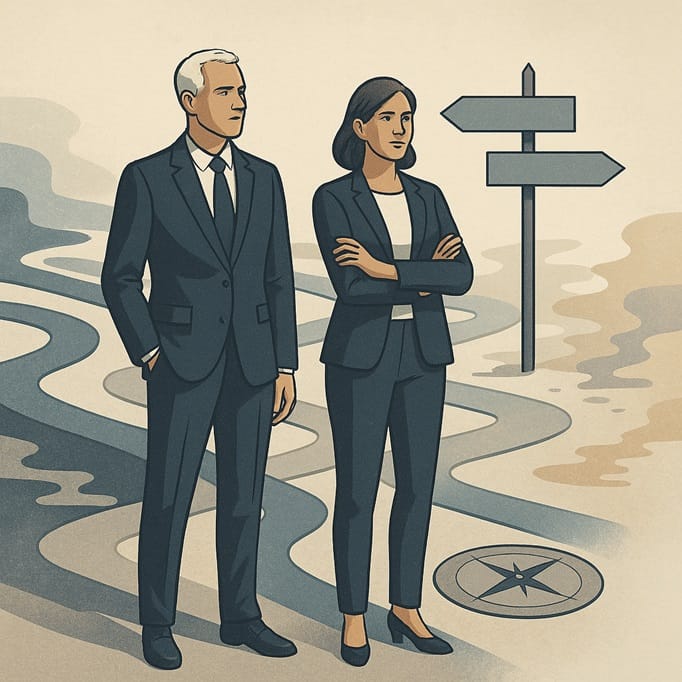Adaptive Leadership – Part 2
Adaptability isn't an innate talent reserved for a lucky few. It’s a set of skills and mindsets that can be nurtured and expanded with deliberate practice.
Adaptability isn't an innate talent reserved for a lucky few. It’s a set of skills and mindsets that can be nurtured and expanded with deliberate practice.

Introduction: Adaptability as a Core Leadership Skill
In the first part of our series, we explored the essential nature of adaptive leadership in navigating today’s increasingly complex, rapidly evolving world. Adaptive leadership isn't just a strategic advantage, it's a fundamental necessity.
But how can leaders practically build and develop these critical adaptive skills? Thankfully, adaptability isn't an innate talent reserved for a lucky few. It’s a set of skills and mindsets that can be nurtured and expanded with deliberate practice, strategic insights, and disciplined application.
At Full Spectrum Leadership, we emphasize intentional growth, guiding leaders towards cultivating adaptability as a powerful leadership attribute.
The Key Adaptive Leadership Skills
To be adaptive is to be skilled in a variety of critical areas. While many traits are beneficial, these five are indispensable:
1. Emotional Intelligence (EQ)
Adaptive leaders understand that navigating change effectively involves managing not only processes but also people and their emotions. Leaders with high EQ:
2. Critical Thinking & Problem-Solving
Adaptive leaders rigorously analyze situations from multiple perspectives:
3. Effective Communication
Clear and transparent communication is vital, particularly in times of uncertainty:
4. Flexibility & Agility
Adaptive leaders are not rigid; instead, they excel at quickly pivoting:
5. Courage & Decisiveness
Adaptability requires courage to make tough decisions without perfect information:
Practical Strategies for Developing Adaptive Skills
Understanding adaptive leadership skills theoretically is only the first step. Here’s how leaders can actively build them:
1. Scenario Planning Exercises
Regularly conduct “what-if” scenario analyses. Consider possible outcomes, anticipate potential disruptions, and collaboratively identify adaptive responses.
Practice Tip:
Set aside time monthly with your team to discuss hypothetical but realistic scenarios. This builds strategic foresight and adaptability in real-time situations.
2. Encourage Ongoing Learning & Experimentation
Create a culture of ongoing curiosity and structured experimentation:
3. Invest in Emotional Intelligence Training
Offer EQ-building workshops and coaching sessions:
4. Foster Open Communication
Create frequent, structured forums for open dialogues and communication:
Real-Life Examples: Leaders Who Adapt
Consider how these exemplary adaptive leaders navigated uncertainty:
These leaders exemplify how adaptive leadership delivers robust results—even in profoundly challenging contexts.
Building a Culture of Adaptability
To truly embed adaptive leadership within your organization, consistently reinforce adaptability through daily practices:
Assess Your Adaptive Leadership: A Reflective Exercise
Consider these reflective questions to assess and build your adaptive leadership skills:
Honest self-reflection is your first step towards meaningful growth and becoming a truly adaptive leader.
To Wrap Up: Taking Action Towards Adaptive Leadership
Becoming adaptive is not a one-time act; it's an ongoing leadership practice. It requires deliberate and consistent effort. Yet, the rewards of developing robust adaptive skills are profound:
At Full Spectrum Leadership, we're dedicated to guiding you on this transformative journey. We invite you to embrace adaptability consciously, proactively, and passionately.
Now is the time to start your deliberate journey towards adaptive leadership. The world is uncertain—but your ability to thrive doesn’t have to be.
Let’s Keep Talking!
Peter Comrie
Co-Founder and Human Capital Specialist at Full Spectrum Leadership Inc.
Reach out to me at peter@fullspectrumleadership.com
Or connect with me here to book a call!
Reach me on Linkedin; https://www.linkedin.com/in/petercomrie/
We can also chat on Bluesky: @petercomrie.bsky.social
Tags: #AdaptiveLeadership #LeadershipDevelopment #FutureSkills #LeadershipTips #Resilience